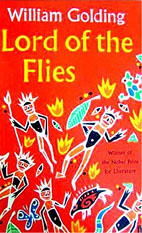Lord of the Flies - William Golding

Well, having had the plot spoilt for me by Ansen Dibell's book, I thought I'd better read the real thing. It does seem a bit presumptuous to be writing reviews of award-winning literary classics, but hey, I'm just a person with a blog who likes writing about the books I've read, so I can just about justify this to myself. Besides, there's no reason that classics should be immune from bloggery, even if a zillion GCSE students have trodden this ground before.
I think everyone knows the basic story, as it's been a staple of popular culture for decades - bunch of schoolboys stranded on a desert island, struggle for leadership, descent into savagery and a sticky end for the fat kid. The reviews on Amazon are pretty essay-tastic and waffle on in exam-friendly ways about the imagery and use of metaphor, but there's no need for that here. Yes, the plot is well structured, and the book has valuable things to say about the human condition, but, well, it's a kids' book. It may be darker and more brutal than most kids' books, but it still suffers from the drawbacks of that genre.
Now, don't get me wrong, I like reading kids' books - one thing that usually distinguishes them is that they have great stories, because that's what kids want. However, they are often also marked by a certain shallowness, and a tendency by authors to fudge the details and skimp on the characterisation, and both of these flaws are apparent in Lord of the Flies. The background is full of nagging inconsistencies - not just the classic moment where the myopic Piggy, in defiance of basic physics, uses his (concave) glasses to start a fire, but it also raised questions like "Why is a group of British public schoolboys, age range 6-12, flying across the Pacific? Why do hardly any of them know each other? If the only animals on the island are pigs, why are there so many fruit trees?" Kids don't care about that stuff, but I do, and the omissions really bugged me.
I was going to go over the weakness of the characterisation now, but thinking about it, it wasn't actually that bad. One thing that stood out, though, was the overt labelling of the characters as "X personality-type" rather than showing it - for example, Piggy was constantly described as the intelligent one, and yet never really did anything particularly clever, he was just an annoying lazy fat kid. The character who rises furthest above the cardboard-cut-out level was Ralph, the main protagonist, but he is only just redeemed from Golden Boy ideal-hero cipherdom by his earlier predilection for mucking about, and his initial dislike of the eminently dislikable Piggy. Ralph's rival Jack was more interesting, in the way that bad guys often are, but he was a fairly stock bad-guy archetype for all that, only distinguished by the fact that he was twelve.
As a story, Lord of the Flies works really well; as a great work of literature much less so. I can't help but feel that its original impact was mostly down to the shock-value of showing kids as the little bastards they really are, which was probably quite a revelation in the 'Fifties. Published today, most people would probably be sceptical about it taking so long for the savagery to begin. Decades of earnest high-school analysis has put this book on a pedestal that I'm not sure it deserves; I wonder if in fifty years' time, the same thing will have happened to Harry Potter?
7/10



1 Comments:
The complete lack of a backstory was why I could never get into this book when I read it in high school at 15. The English teacher I had didn't help, either.
Post a Comment
<< Home